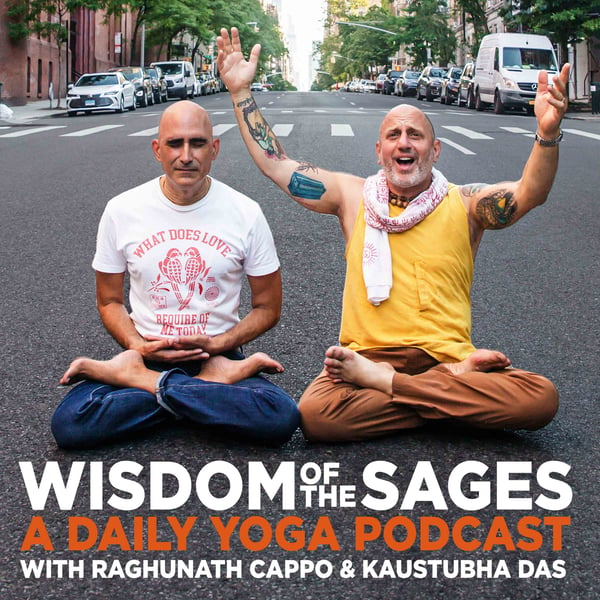1653: The Yogic Science Behind Krishna’s Stories
Wisdom of the Sages
David Ramella
5 • 970 Ratings
🗓️ 11 August 2025
⏱️ 54 minutes
🧾️ Download transcript
Summary
The great sages of ancient India understood the stories of Krishna to be far more than charming children’s tales. Through the sophisticated lens of the Sanskrit science of drama, they revealed just how richly structured and deeply meaningful these pastimes are — spiritual dramas designed to awaken devotion and evoke profound yogic experience.
This episode explores how spiritual life must be alive and nourished with emotion. As Abraham Joshua Heschel observed, when faith is replaced by creed, worship by discipline, love by habit — and when religion speaks in the name of authority rather than with a voice of compassion — its message becomes meaningless. Krishna’s pastimes restore that life and compassion, stirring joy, longing, fear, and relief in the hearts of the residents of Vṛndāvana, and awakening the same divine emotions within us.
Srimad Bhagavatam 10.7.20-26
*********************************************************************
LOVE THE PODCAST? WE ARE COMMUNITY SUPPORTED AND WOULD LOVE FOR YOU TO JOIN!
Go to https://www.wisdomofthesages.com
WATCH ON YOUTUBE: https://youtube.com/@WisdomoftheSages
LISTEN ON ITUNES: https://podcasts/apple.com/us/podcast/wisdom-of-the-sages/id1493055485
CONNECT ON FACEBOOK: https://facebook.com/wisdomofthesages108
Transcript
Click on a timestamp to play from that location
| 0:00.0 | one of the greatest or even people argue like the greatest teacher in our lineage |
| 0:04.6 | is rupertagoswami and what he did this you know there's so many lineages of vedanta |
| 0:13.6 | and they all have their different contributions what they share that's like they're looking |
| 0:19.2 | at the same books but then they give an angle on it that's |
| 0:21.9 | special you know yeah and what he shared is so special and it makes this lineage so special |
| 0:28.9 | he took these pastimes of krishna and he analyzed them through a particular lens so that |
| 0:35.9 | we can understand them and And that lens is like what |
| 0:41.5 | they call, I guess scholars would call it like Indian, ancient Indian Sanskrit, really Sanskrit |
| 0:50.1 | is I believe it's called dramaturgy, is that how you pronounce it like the study of |
| 0:54.7 | dramaturgy I have no idea never even heard that word the study of drama and you know like all |
| 1:01.0 | like we were just talking about music you know music has beat music has melody music has you know |
| 1:05.4 | there's rhythm within rhythm there's beat you know there's there's there's melody there's tempo |
| 1:10.5 | there's it has all know, there's, there's melody, there's tempo, there's, it has all these |
| 1:11.6 | different elements. Harmony. |
| 1:15.4 | Within drama, there's different elements. And there's this really beautiful, sophisticated |
| 1:20.3 | study of drama that goes back in these ancients, that sages wrote, you know, in ancient |
| 1:26.5 | Sanskrit text. And they speak about what we mentioned earlier, |
| 1:32.9 | Russa, right, like the different varieties of emotion and the different varieties of love. |
| 1:39.1 | And what stimulates them, what increases them, what decreases them, which ones blend nicely, which ones |
| 1:45.3 | don't blend nicely, what kind of characters, what do you have in your drama, what do they |
| 1:51.4 | embody and how they all blend together? |
| 1:53.9 | So there's like, just like there's a science to like, you know, within music, there's certain |
... |
Transcript will be available on the free plan in 15 days. Upgrade to see the full transcript now.
Disclaimer: The podcast and artwork embedded on this page are from David Ramella, and are the property of its owner and not affiliated with or endorsed by Tapesearch.
Generated transcripts are the property of David Ramella and are distributed freely under the Fair Use doctrine. Transcripts generated by Tapesearch are not guaranteed to be accurate.
Copyright © Tapesearch 2025.

